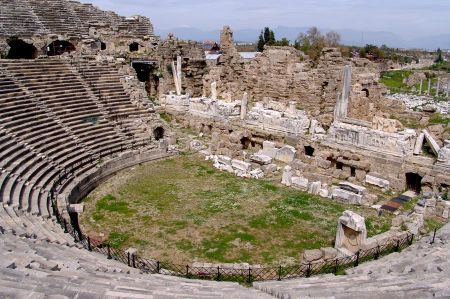Theatre of Side - from Hellenistic to Roman design
The former classsical Greek Theatre of Side was changed and more seats (cavea) were added during Roman period in shape of a bend, a bit bigger than a semicircle, around the circular floor (orchestra) and the stage, where the play was performed.
The place of Greek and Roman Theatres were mostly chosen in a way, that the natural gradient of a slope could be used, quite often with a wonderful view of the landscape.
At the great period of Greek tragedies and comedies (5th century BC) they started using the theatre with a raised mostly wooden stage (scenae), which later in the Hellenistic period was made of stone.
The Romans preferred to close the theatre behind the stage with a huge wall to be used within the performance of the play too. Greek side entrances (parodos) were never covered, but the Romans connected all parts of the building togethe into one complex witch then covered the side entrances too. If there was no natural slope for the cavae, they built an artificial one, for example in the form of arcades. This happened in the same way, when the seats were not enough because town was growing. The spectators’ seats were usually divided by a horizontal path way, which was called diazoma.
In Side there was a wall added in front of the spectators seats, water proof enough with special concrete, so that the inside could even be flooded. The reason for that was, to be able to use even ships for their theatre plays.
Please read as well:
Side´s ruins - Roman period with huge theatre building
Water supply of the ancient Metropolis of Side
-
 The ancient Roman Theatre of Side
The ancient Roman Theatre of Side
The ancient Roman Theatre of Side
The ancient Roman Theatre of Side
-
 The ancient Roman Theatre of Side
The ancient Roman Theatre of Side
The ancient Roman Theatre of Side
The ancient Roman Theatre of Side
-
 The ancient Roman Theatre of Side
The ancient Roman Theatre of Side
The ancient Roman Theatre of Side
The ancient Roman Theatre of Side
-
 The ancient Roman Theatre of Side
The ancient Roman Theatre of Side
The ancient Roman Theatre of Side
The ancient Roman Theatre of Side
-
 The ancient Roman Theatre of Side
The ancient Roman Theatre of Side
The ancient Roman Theatre of Side
The ancient Roman Theatre of Side
-
 The ancient Roman Theatre of Side
The ancient Roman Theatre of Side
The ancient Roman Theatre of Side
The ancient Roman Theatre of Side
-
 The ancient Roman Theatre of Side
The ancient Roman Theatre of Side
The ancient Roman Theatre of Side
The ancient Roman Theatre of Side
-
 The ancient Roman Theatre of Side
The ancient Roman Theatre of Side
The ancient Roman Theatre of Side
The ancient Roman Theatre of Side
-
 The ancient Roman Theatre of Side
The ancient Roman Theatre of Side
The ancient Roman Theatre of Side
The ancient Roman Theatre of Side
-
 The ancient Roman Theatre of Side
The ancient Roman Theatre of Side
The ancient Roman Theatre of Side
The ancient Roman Theatre of Side
-
 The ancient Roman Theatre of Side
The ancient Roman Theatre of Side
The ancient Roman Theatre of Side
The ancient Roman Theatre of Side
-
 The ancient Roman Theatre of Side
The ancient Roman Theatre of Side
The ancient Roman Theatre of Side
The ancient Roman Theatre of Side
-
 The ancient Roman Theatre of Side
The ancient Roman Theatre of Side
The ancient Roman Theatre of Side
The ancient Roman Theatre of Side
-
 The ancient Roman Theatre of Side
The ancient Roman Theatre of Side
The ancient Roman Theatre of Side
The ancient Roman Theatre of Side
-
 The ancient Roman Theatre of Side
The ancient Roman Theatre of Side
The ancient Roman Theatre of Side
The ancient Roman Theatre of Side
https://www.alaturka.info/en/turkey-country/riviera/1789-theatre-of-side#sigProId626e92f1ce

